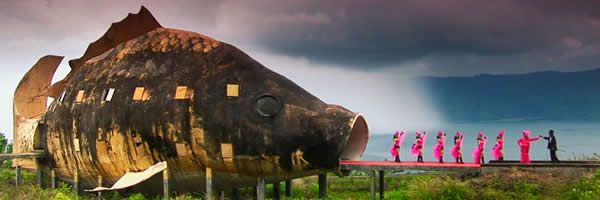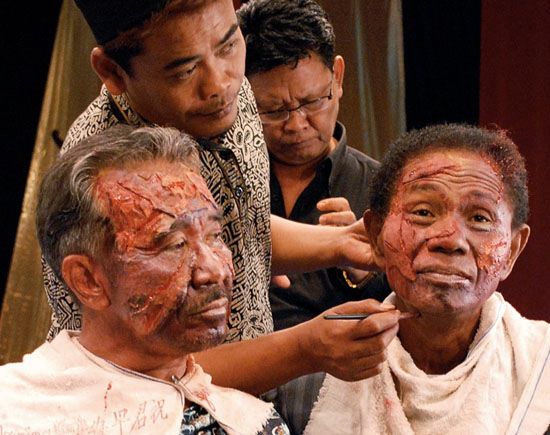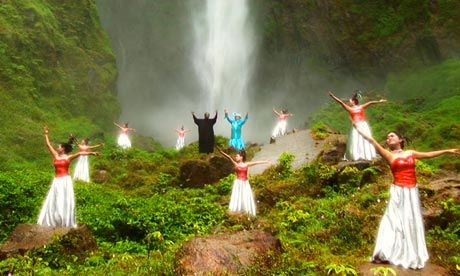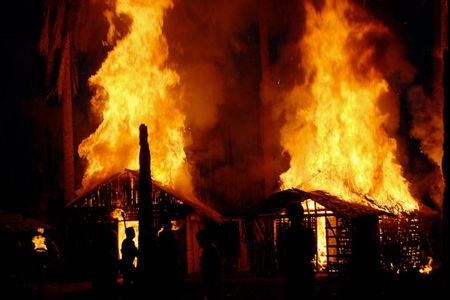The Act Of Killing is one of those movies that you might only see at a film festival and don’t want to miss out on the chance of catching. It’s a documentary like no other I’ve seen and undoubtedly one of the most disturbing movies screened at TIFF this year. The title says it all. The film is about the weight of murder on the perpetrator’s conscious. That might take years to finally surface as it does for the subject of director Joshua Oppenheimer’s searing new doc. The fact that the unimaginable delay occurred is unthinkable, but the fact that Oppenheimer was somehow there with a camera to capture it is remarkable. The film will never be described as an easy watch, but it is something that will leave a deep impression on anyone able to see it and should definitely be sampled by those with the stomach to endure. Hit the jump for the details.
Oppenheimer’s hypnotic tale of audacity and accountability is routed in the disgusting war crimes that plagued Indonesia in the 60s. Following a military coup, President General Suharto sanctioned the killing of communists and a witch hunt began. Gangsters and hoods were given cushy government positions and within a year over a million people were murdered, often as the result of allegation or connection and without evidence. The people responsible for the disgusting crimes were never punished. In fact, they still thrive in the country today and many even hold major positions of political power. That’s where Oppenheimer comes in.
The director approached these killers with an ingenious concept that would allow him to thoroughly interrogate them about their communist liquidation. He offered the chance to film detailed recreations of the murders and surprisingly a few of the tyrants bit. Specifically, Anwar Congo is both immensely proud of his past and a movie buff anxious to bring it to life with glitzy production values and a cast of involuntary extras. Appropriately, Anwar began his career as a “movie theater gangster” hustling tickets and harassing patrons while getting lost in American features every night. He repeatedly informs the camera that in Indonesia the word for “gangster” means “free man” and clearly shows no remorse for his crimes (at one point even saying, “all this stuff about human rights really pisses me off”).
Congo is thrilled at the thought of reenacting his crimes, immediately recruiting a team of friends and locals to participate and even dying his white hair black to play his younger self. The scenes in which Oppenheimer shoots these reconstructions are stunningly bleak. Children are whipped around and told to cry like they did in the actual events. They do, but understandably can’t stop when the cameras aren’t rolling much to the chagrin of Congo and his former death squad buddies. Remarkably, the recreations actually cause Congo and co. to question the motivation and actions of their murdering selves for the first time. At one point they worry that the recreated mass slaughter of a village is a little over the top and violent, but eventually concede that it did happen that way and maybe should have value. In one of the most revealing scenes, Congo decides to play the role of a tortured communist being interrogated/murdered (he later insists on showing this scene to his pre-teen grandchildren) and freaks out once the very wire he used to strangle dozens of men is around his own neck, left in stunned silence for a few minutes once he has to experience a mere fraction of the pain he caused.
That Oppenheimer somehow managed to capture those moments with a camera is remarkable and the footage is devastating. Given the nature of the material and how it was captured, the movie is by necessity meandering. It seems to flutter about in a detached and episodic manner as the director gains trust and start staging scenes, but when it all comes together the result is some of the most disturbing and revealing documentary footage ever captured. Every one of the director’s subjects eventually hangs themselves through their own words with Congo in particular suffering a collapse and moments of revelation on camera. It’s a miracle that the filmmaker was there for the final scene and it’s an incredibly revealing and visceral moment of revelation/revulsion that needs to be seen to be believed.
The Act Of Killing is an undeniably remarkable documentary (heralded by Werner Herzog and documentary master Errol Morris before release and admitted into festivals with their names attached as executive producers). It’s an honest and painful examination of the weight of murder and also a hypnotically constructed work of film in it’s own right. Opening with a scene of choreographed dance by a giant fish (presumably one of Congo’s oddball requests) and filled with bizarre moments like seeing former death squad members dressed in drag for recreations, there’s a twisted streak of dark humor slipped in amongst the emotionally devastating tragedy. It’s not exactly enough lighten the mood of the film by any stretch of the imagination, but enough to show Oppenheimer’s varied skills as a filmmaker. He isn’t someone simply interested in shock value. He’s a filmmaker fascinated by the darkest and oddest extremes of the human condition. The Act Of Killing certainly goes to places few films have managed before and hopefully it’s not a project destined to live and die on the festival circuit. It’s something audiences need to see, even if they won’t exactly enjoy the experience in any conventional sense.
Rating: A
Click here for all of our TIFF 2012 coverage.




